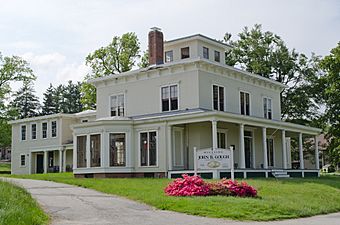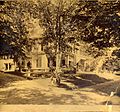John B. Gough House facts for kids
|
John B. Gough House
|
|
 |
|
| Location | Boylston, Massachusetts |
|---|---|
| Built | 1848 |
| Architectural style | Italianate |
| NRHP reference No. | 74001763 |
Quick facts for kids Significant dates |
|
| Added to NRHP | March 19, 1974 |
| Designated NHL | May 30, 1974 |
The John B. Gough House, also known as Hillside, is a very important old house in Boylston, Massachusetts. It is special because it was the home of John B. Gough. He was a famous speaker who talked about the temperance movement. This movement encouraged people to avoid alcohol. The house is also a great example of Italianate architecture, a popular style from the 1800s.
John B. Gough married Mary Whitcombe in 1846. She was from Boylston. In 1848, they built this two-story farmhouse. Gough lived here until he passed away in 1886.
Contents
About the House
The John B. Gough House has a shape that is almost square. It has three sections on each side. The house has a flat roof with a square belvedere on top. A belvedere is a small room or structure on a roof, offering nice views.
Architectural Style
The house features wide eaves that hang over the sides. These eaves have decorative brackets underneath them. A wide porch stretches across the entire front of the house. Some parts have been added to the back of the house over time.
History of Ownership
After John B. Gough passed away, William J. Hogg bought the house. He owned the Crompton Carpet Company in Worcester. For many years in the 1900s, the property was used as a school. It was called the Shepherd Knapp School.
Later Uses
In the 1980s, a company called Digital Equipment Corporation bought the property. They used it as a place to train their employees. Today, the Boylston Historical Society owns the house. They are working to fix it up and bring it back to its original look.
National Recognition
The John B. Gough House is very important. It was named a National Historic Landmark in 1974. It was also added to the National Register of Historic Places in the same year. This means it is recognized as a significant historical place in the United States.
Images for kids
See also
 | Kyle Baker |
 | Joseph Yoakum |
 | Laura Wheeler Waring |
 | Henry Ossawa Tanner |







